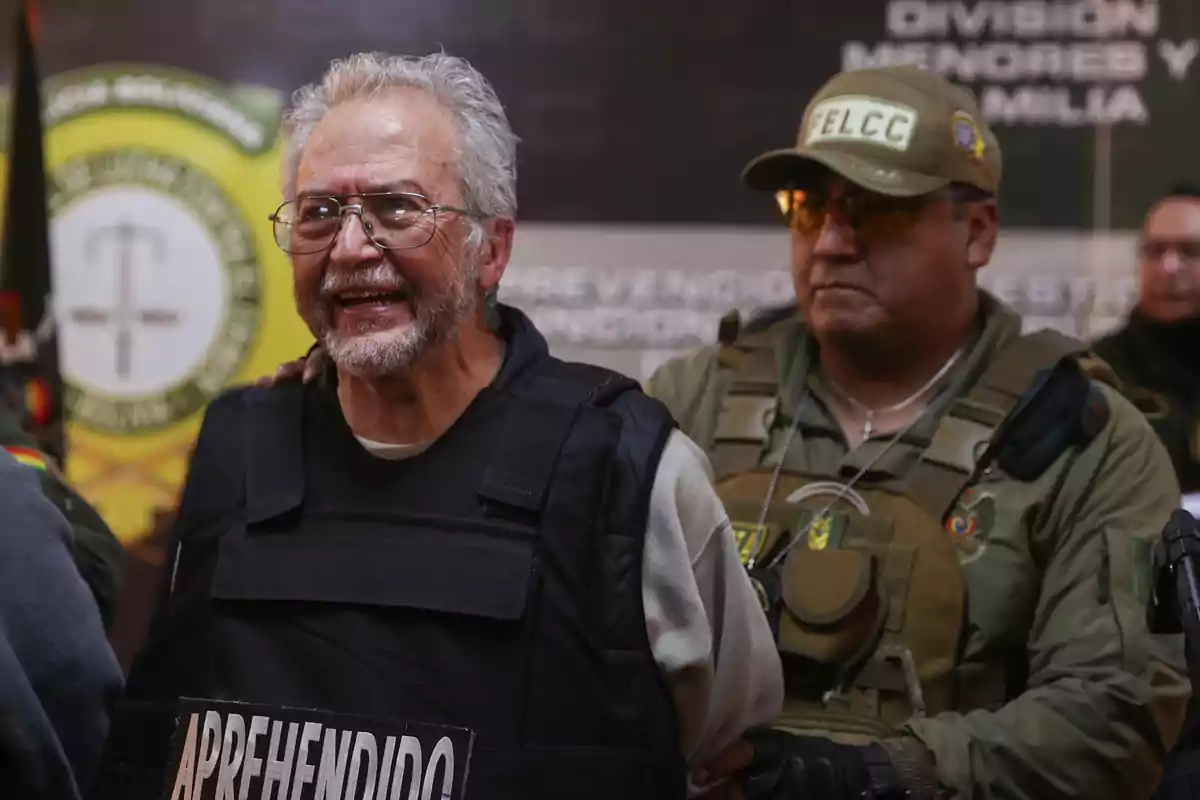
False Coup d'État: Masista Justice Sentenced Aníbal Aguilar to Two Years in Prison
Aníbal Aguilar is identified by Luis Arce's masista regime as the mastermind behind the 26J
Aníbal Aguilar was sentenced to two years in prison in a summary trial driven by the Public Ministry. Luis Arce's government considers him the mastermind of the false coup d'état of June 26, 2024.
The sentence is for terrorism and armed uprising in the degree of complicity. However, because the penalty is minor, he can opt for a conditional suspension. The Prosecutor's Office did not clarify whether he remains imprisoned in San Pedro or if he has already been released.
Aguilar was arrested without a warrant a day after the military uprising led by General Juan José Zúñiga. He was 71 years old, suffered from cancer, and was taken from his home by more than twenty police officers in front of his family.
According to his son, he spent almost a day incommunicado in unsanitary cells. They claim he was pressured to accept the summary procedure. Initially, his defense rejected this judicial outcome.
Aguilar's family keeps that there is no evidence linking him to a conspiracy. Only a photograph of him walking near the Casa Grande del Pueblo was presented.
Minister Edmundo Novillo publicly accused him of being the "strategist" of the uprising. He was also presented to the press handcuffed, without a lawyer, and without his consent. This violates due process norms.
Aguilar worked as a consultant in the Ministry of Defense drafting speeches and evaluating institutional strategies. He was also an evangelical pastor and university professor.
A scapegoat of masismo
[IMAGE]{1034404}[/IMAGE]
The evangelical church in Bolivia and Latin America called for his immediate release. They consider that his health doesn't allow him to remain in prison. His son claims he was used as a "scapegoat" to justify apolitical setup.
Human rights organizations like AJDH have documented multiple irregularities. His house arrest was revoked without new evidence or solid arguments.
He was accused without evidence of meetings or communications with the military. Prosecutor Mejillones never explained how that conclusion was reached. The defense denounced private meetings between judges and executive officials.
AJDH warns that Aguilar's case responds to a political control strategy. His imprisonment aimed to reinforce the government's narrative about an alleged coup.
The improvisation of General Zúñiga and the rapid official reaction fuel suspicions. Several analysts believe that it was a manipulated action to gain legitimacy. Even sectors of MAS questioned the official version.
Zúñiga himself was accused and is imprisoned, but his motivation remains unclear. Some also consider him a sacrificed piece of the political chessboard.
So far, at least four people have been sentenced in summary trials for this case. There are 22 more with formal charges, including Zúñiga. Three military personnel also requested the summary procedure and a three-year sentence.
The crimes include armed uprising and resolutions contrary to the Constitution. The Prosecutor's Office withdrew the charges of magnicide due to lack of evidence.
Was he forced to accept the charges?
[IMAGE]{1035118}[/IMAGE]
The conviction against Aguilar caused criticism for its low penalty compared to the charges. But it also raised doubts about the validity of his admission of guilt.
His son said that he was pressured and blackmailed to accept the agreement. Lawyer Miguel Ramírez questioned the legality of the entire process. He pointed out that a real connection between Aguilar and the events of June 26 was never demonstrated.
The AJDH report mentions that there are 347 political persecuted in Bolivia. They include cases from the governments of Evo Morales, Jeanine Áñez, and Luis Arce. The use of justice to silence uncomfortable voices has become a common practice for the regime.
The Ombudsman's Office also called for stopping the media exposure of detainees. It recommended training security forces in human rights.
Despite the preventive detention period expiring in December, Aguilar remained imprisoned. He only agreed to the summary trial under threats of indefinitely prolonging the process.
His health deteriorated, and his family claims that the treatment in prison was inhumane. The food and medical conditions were deficient. It is a case that has caused national and international outrage.
The government has not replied to the allegations of political persecution in this case. It has also not presented new evidence since the initial charge. The justice system has not summoned the alleged accomplices to trial.
Masismo strengthened its narrative
[IMAGE]{1035127}[/IMAGE]
The entire process shows a lack of judicial independence. For Aguilar's family, this is yet another example of how an official narrative is fabricated.
The two-year sentence could mean immediate freedom. But it doesn't repair the damage caused to his health, image, and family life.
The case leaves many questions unanswered. What was the government seeking with this accusation? Why was a sentence rushed without solid evidence? What role did Aguilar really play in the events of June 26?
Analysts agree that the government needed to show culprits. The narrative of the attempted coup needed visible faces. Aguilar was an easy target due to his position and previous connections.
But his profile doesn't fit that of a military conspirator. The case highlights a worrying trend of politicizing the judiciary.
The final verdict was directed by political power. Aguilar was condemned before being heard. His guilt was constructed from the state's media apparatus.
With the sentence, the government attempts to close the chapter of the false coup d'état. But the aftermath for the family and the country's democracy is just beginning.
More posts: